Entrepreneurship Report: SMEs, Brexit, and Entrepreneurial Ventures
VerifiedAdded on 2020/10/04
|14
|4299
|25
Report
AI Summary
This report provides a comprehensive overview of entrepreneurship, focusing on its various types, including small business, scalable startups, large company, and social entrepreneurship. It analyzes the impact of SMEs on the UK economy, supported by statistical data, and discusses the effect...

Entrepreneurship
1
1
Paraphrase This Document
Need a fresh take? Get an instant paraphrase of this document with our AI Paraphraser
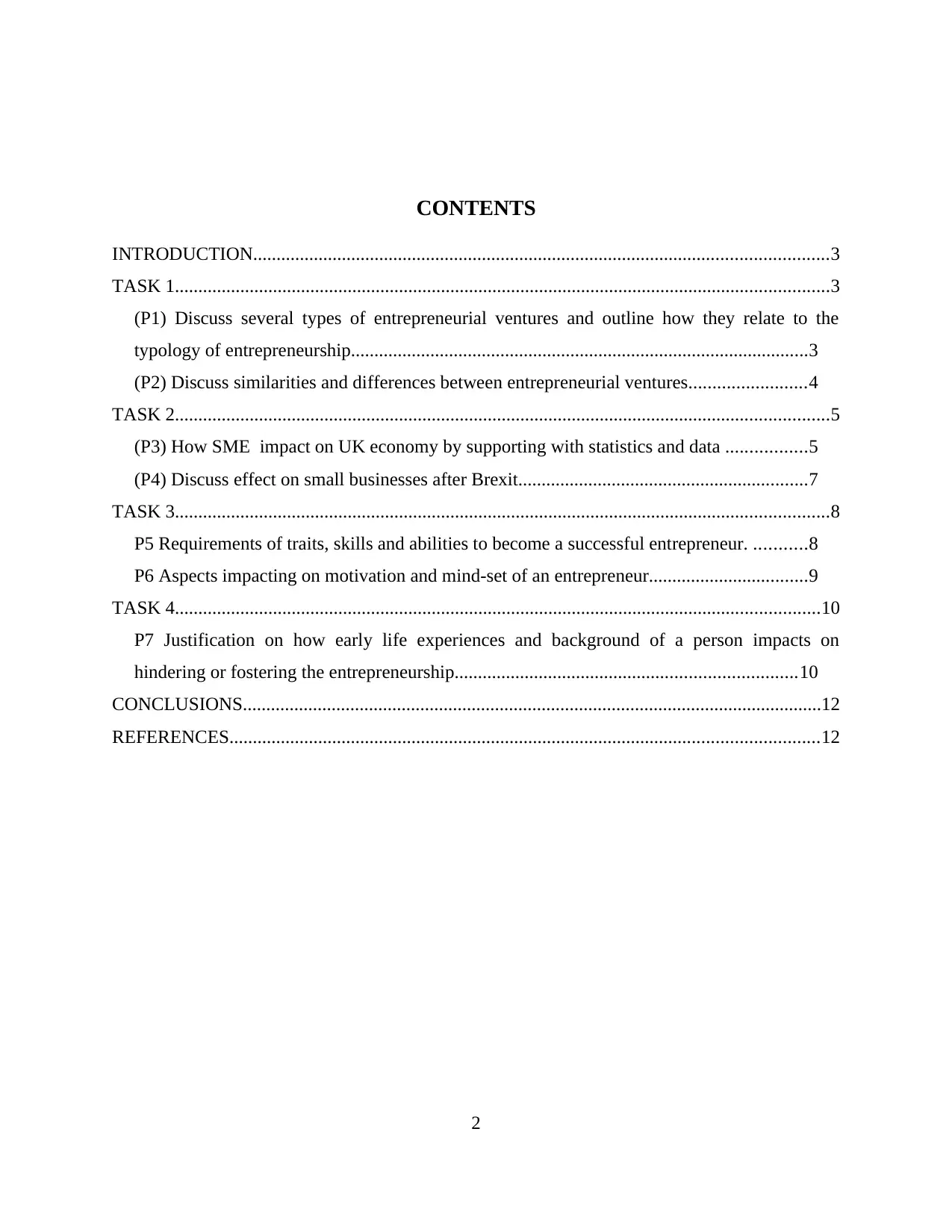
CONTENTS
INTRODUCTION...........................................................................................................................3
TASK 1............................................................................................................................................3
(P1) Discuss several types of entrepreneurial ventures and outline how they relate to the
typology of entrepreneurship..................................................................................................3
(P2) Discuss similarities and differences between entrepreneurial ventures.........................4
TASK 2............................................................................................................................................5
(P3) How SME impact on UK economy by supporting with statistics and data .................5
(P4) Discuss effect on small businesses after Brexit..............................................................7
TASK 3............................................................................................................................................8
P5 Requirements of traits, skills and abilities to become a successful entrepreneur. ...........8
P6 Aspects impacting on motivation and mind-set of an entrepreneur..................................9
TASK 4..........................................................................................................................................10
P7 Justification on how early life experiences and background of a person impacts on
hindering or fostering the entrepreneurship.........................................................................10
CONCLUSIONS............................................................................................................................12
REFERENCES..............................................................................................................................12
2
INTRODUCTION...........................................................................................................................3
TASK 1............................................................................................................................................3
(P1) Discuss several types of entrepreneurial ventures and outline how they relate to the
typology of entrepreneurship..................................................................................................3
(P2) Discuss similarities and differences between entrepreneurial ventures.........................4
TASK 2............................................................................................................................................5
(P3) How SME impact on UK economy by supporting with statistics and data .................5
(P4) Discuss effect on small businesses after Brexit..............................................................7
TASK 3............................................................................................................................................8
P5 Requirements of traits, skills and abilities to become a successful entrepreneur. ...........8
P6 Aspects impacting on motivation and mind-set of an entrepreneur..................................9
TASK 4..........................................................................................................................................10
P7 Justification on how early life experiences and background of a person impacts on
hindering or fostering the entrepreneurship.........................................................................10
CONCLUSIONS............................................................................................................................12
REFERENCES..............................................................................................................................12
2
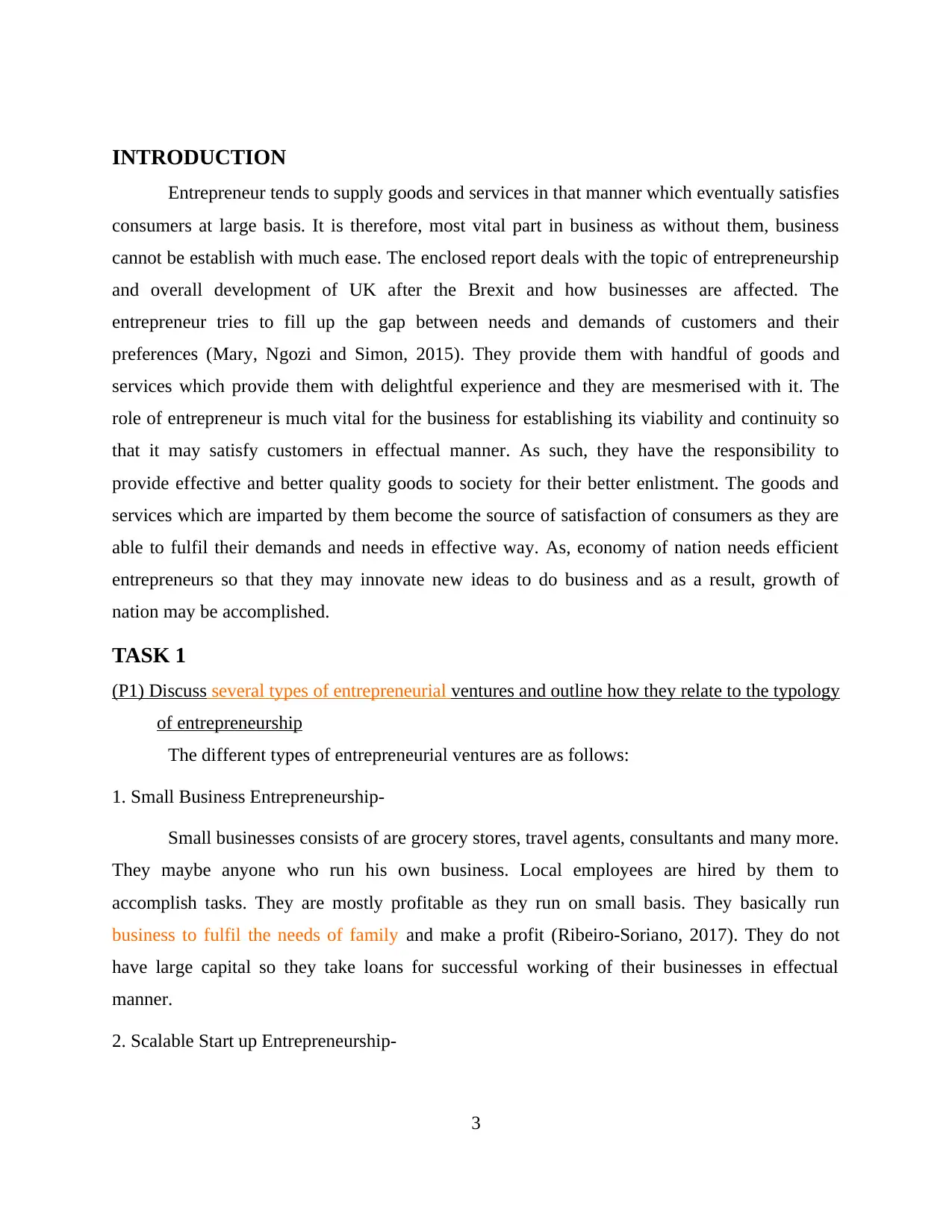
INTRODUCTION
Entrepreneur tends to supply goods and services in that manner which eventually satisfies
consumers at large basis. It is therefore, most vital part in business as without them, business
cannot be establish with much ease. The enclosed report deals with the topic of entrepreneurship
and overall development of UK after the Brexit and how businesses are affected. The
entrepreneur tries to fill up the gap between needs and demands of customers and their
preferences (Mary, Ngozi and Simon, 2015). They provide them with handful of goods and
services which provide them with delightful experience and they are mesmerised with it. The
role of entrepreneur is much vital for the business for establishing its viability and continuity so
that it may satisfy customers in effectual manner. As such, they have the responsibility to
provide effective and better quality goods to society for their better enlistment. The goods and
services which are imparted by them become the source of satisfaction of consumers as they are
able to fulfil their demands and needs in effective way. As, economy of nation needs efficient
entrepreneurs so that they may innovate new ideas to do business and as a result, growth of
nation may be accomplished.
TASK 1
(P1) Discuss several types of entrepreneurial ventures and outline how they relate to the typology
of entrepreneurship
The different types of entrepreneurial ventures are as follows:
1. Small Business Entrepreneurship-
Small businesses consists of are grocery stores, travel agents, consultants and many more.
They maybe anyone who run his own business. Local employees are hired by them to
accomplish tasks. They are mostly profitable as they run on small basis. They basically run
business to fulfil the needs of family and make a profit (Ribeiro-Soriano, 2017). They do not
have large capital so they take loans for successful working of their businesses in effectual
manner.
2. Scalable Start up Entrepreneurship-
3
Entrepreneur tends to supply goods and services in that manner which eventually satisfies
consumers at large basis. It is therefore, most vital part in business as without them, business
cannot be establish with much ease. The enclosed report deals with the topic of entrepreneurship
and overall development of UK after the Brexit and how businesses are affected. The
entrepreneur tries to fill up the gap between needs and demands of customers and their
preferences (Mary, Ngozi and Simon, 2015). They provide them with handful of goods and
services which provide them with delightful experience and they are mesmerised with it. The
role of entrepreneur is much vital for the business for establishing its viability and continuity so
that it may satisfy customers in effectual manner. As such, they have the responsibility to
provide effective and better quality goods to society for their better enlistment. The goods and
services which are imparted by them become the source of satisfaction of consumers as they are
able to fulfil their demands and needs in effective way. As, economy of nation needs efficient
entrepreneurs so that they may innovate new ideas to do business and as a result, growth of
nation may be accomplished.
TASK 1
(P1) Discuss several types of entrepreneurial ventures and outline how they relate to the typology
of entrepreneurship
The different types of entrepreneurial ventures are as follows:
1. Small Business Entrepreneurship-
Small businesses consists of are grocery stores, travel agents, consultants and many more.
They maybe anyone who run his own business. Local employees are hired by them to
accomplish tasks. They are mostly profitable as they run on small basis. They basically run
business to fulfil the needs of family and make a profit (Ribeiro-Soriano, 2017). They do not
have large capital so they take loans for successful working of their businesses in effectual
manner.
2. Scalable Start up Entrepreneurship-
3
You're viewing a preview
Unlock full access by subscribing today!
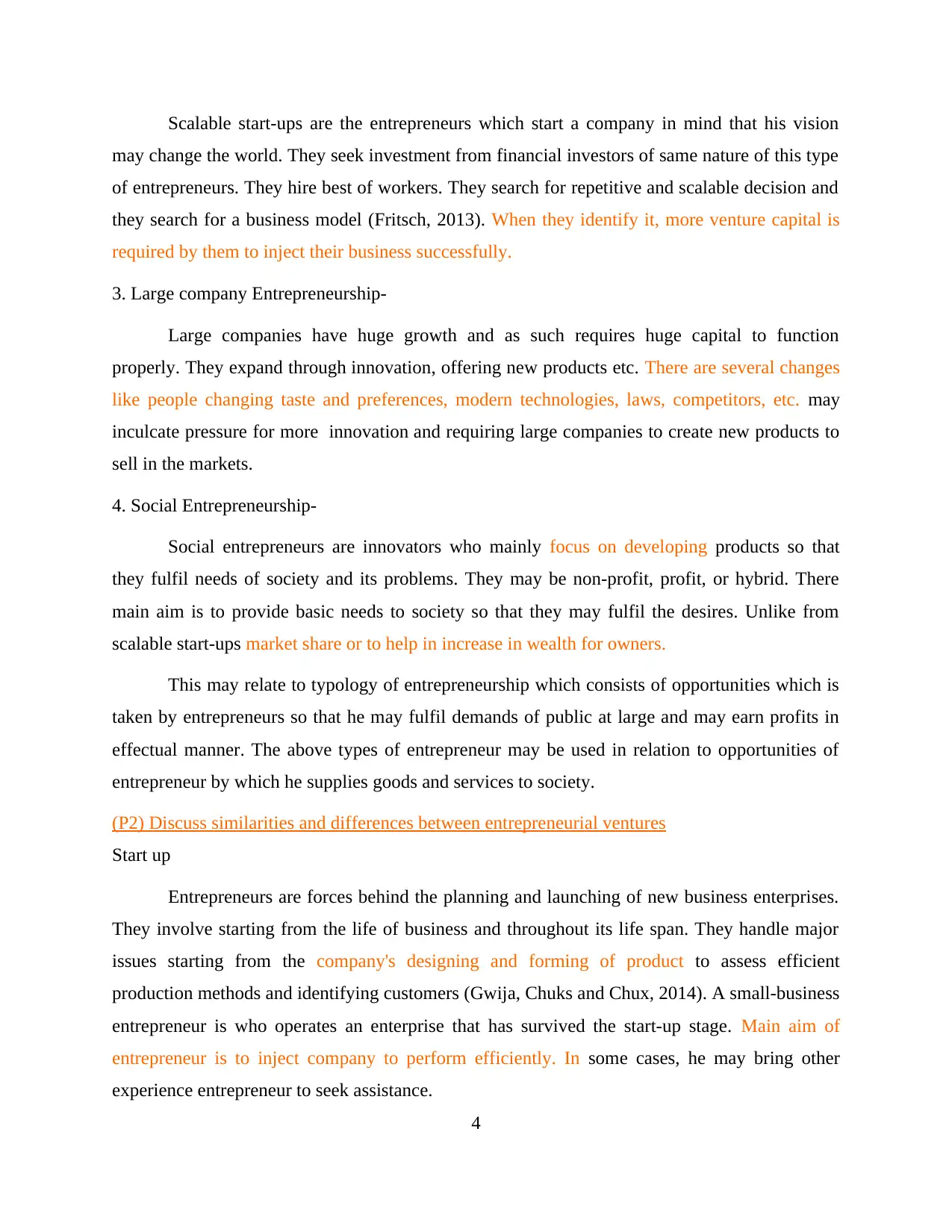
Scalable start-ups are the entrepreneurs which start a company in mind that his vision
may change the world. They seek investment from financial investors of same nature of this type
of entrepreneurs. They hire best of workers. They search for repetitive and scalable decision and
they search for a business model (Fritsch, 2013). When they identify it, more venture capital is
required by them to inject their business successfully.
3. Large company Entrepreneurship-
Large companies have huge growth and as such requires huge capital to function
properly. They expand through innovation, offering new products etc. There are several changes
like people changing taste and preferences, modern technologies, laws, competitors, etc. may
inculcate pressure for more innovation and requiring large companies to create new products to
sell in the markets.
4. Social Entrepreneurship-
Social entrepreneurs are innovators who mainly focus on developing products so that
they fulfil needs of society and its problems. They may be non-profit, profit, or hybrid. There
main aim is to provide basic needs to society so that they may fulfil the desires. Unlike from
scalable start-ups market share or to help in increase in wealth for owners.
This may relate to typology of entrepreneurship which consists of opportunities which is
taken by entrepreneurs so that he may fulfil demands of public at large and may earn profits in
effectual manner. The above types of entrepreneur may be used in relation to opportunities of
entrepreneur by which he supplies goods and services to society.
(P2) Discuss similarities and differences between entrepreneurial ventures
Start up
Entrepreneurs are forces behind the planning and launching of new business enterprises.
They involve starting from the life of business and throughout its life span. They handle major
issues starting from the company's designing and forming of product to assess efficient
production methods and identifying customers (Gwija, Chuks and Chux, 2014). A small-business
entrepreneur is who operates an enterprise that has survived the start-up stage. Main aim of
entrepreneur is to inject company to perform efficiently. In some cases, he may bring other
experience entrepreneur to seek assistance.
4
may change the world. They seek investment from financial investors of same nature of this type
of entrepreneurs. They hire best of workers. They search for repetitive and scalable decision and
they search for a business model (Fritsch, 2013). When they identify it, more venture capital is
required by them to inject their business successfully.
3. Large company Entrepreneurship-
Large companies have huge growth and as such requires huge capital to function
properly. They expand through innovation, offering new products etc. There are several changes
like people changing taste and preferences, modern technologies, laws, competitors, etc. may
inculcate pressure for more innovation and requiring large companies to create new products to
sell in the markets.
4. Social Entrepreneurship-
Social entrepreneurs are innovators who mainly focus on developing products so that
they fulfil needs of society and its problems. They may be non-profit, profit, or hybrid. There
main aim is to provide basic needs to society so that they may fulfil the desires. Unlike from
scalable start-ups market share or to help in increase in wealth for owners.
This may relate to typology of entrepreneurship which consists of opportunities which is
taken by entrepreneurs so that he may fulfil demands of public at large and may earn profits in
effectual manner. The above types of entrepreneur may be used in relation to opportunities of
entrepreneur by which he supplies goods and services to society.
(P2) Discuss similarities and differences between entrepreneurial ventures
Start up
Entrepreneurs are forces behind the planning and launching of new business enterprises.
They involve starting from the life of business and throughout its life span. They handle major
issues starting from the company's designing and forming of product to assess efficient
production methods and identifying customers (Gwija, Chuks and Chux, 2014). A small-business
entrepreneur is who operates an enterprise that has survived the start-up stage. Main aim of
entrepreneur is to inject company to perform efficiently. In some cases, he may bring other
experience entrepreneur to seek assistance.
4
Paraphrase This Document
Need a fresh take? Get an instant paraphrase of this document with our AI Paraphraser
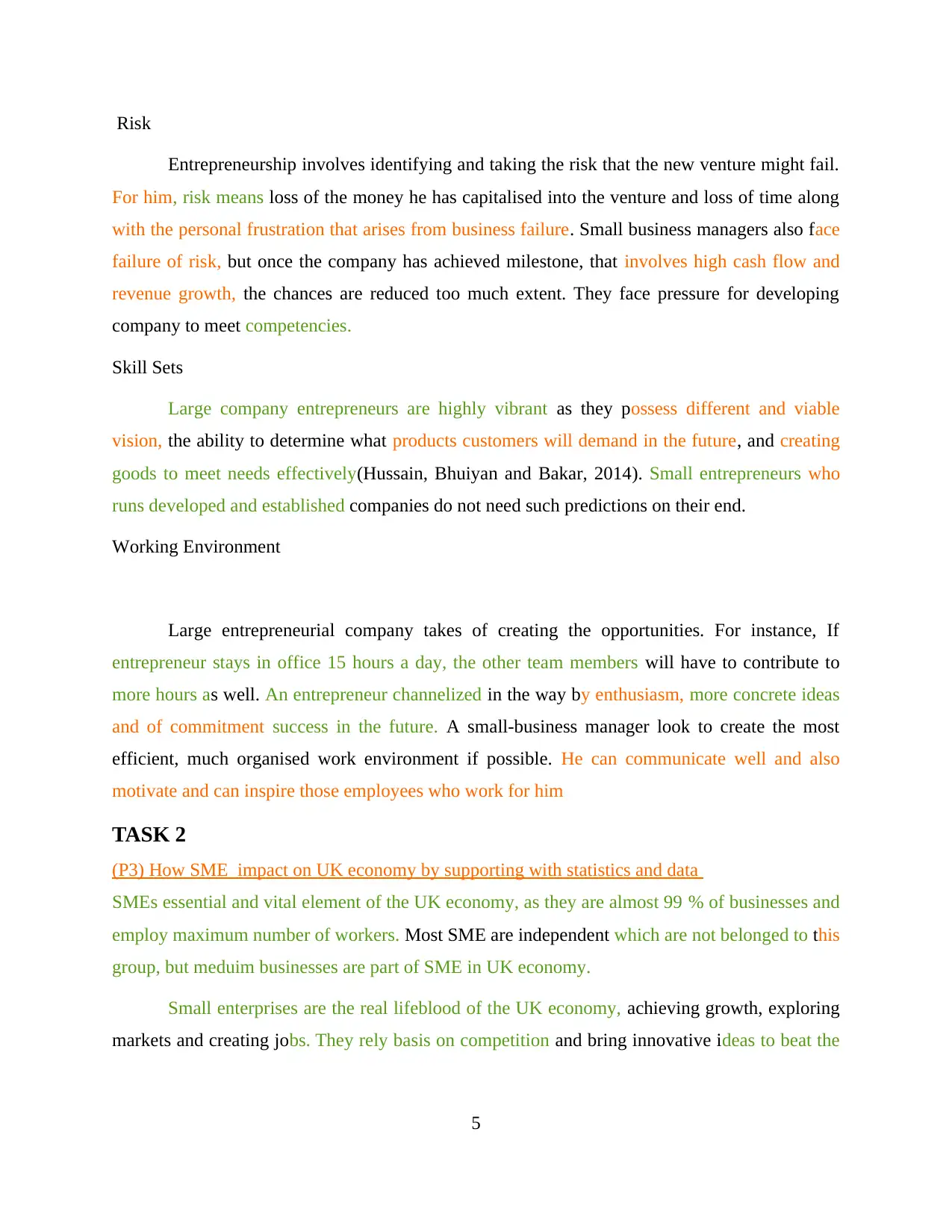
Risk
Entrepreneurship involves identifying and taking the risk that the new venture might fail.
For him, risk means loss of the money he has capitalised into the venture and loss of time along
with the personal frustration that arises from business failure. Small business managers also face
failure of risk, but once the company has achieved milestone, that involves high cash flow and
revenue growth, the chances are reduced too much extent. They face pressure for developing
company to meet competencies.
Skill Sets
Large company entrepreneurs are highly vibrant as they possess different and viable
vision, the ability to determine what products customers will demand in the future, and creating
goods to meet needs effectively(Hussain, Bhuiyan and Bakar, 2014). Small entrepreneurs who
runs developed and established companies do not need such predictions on their end.
Working Environment
Large entrepreneurial company takes of creating the opportunities. For instance, If
entrepreneur stays in office 15 hours a day, the other team members will have to contribute to
more hours as well. An entrepreneur channelized in the way by enthusiasm, more concrete ideas
and of commitment success in the future. A small-business manager look to create the most
efficient, much organised work environment if possible. He can communicate well and also
motivate and can inspire those employees who work for him
TASK 2
(P3) How SME impact on UK economy by supporting with statistics and data
SMEs essential and vital element of the UK economy, as they are almost 99 % of businesses and
employ maximum number of workers. Most SME are independent which are not belonged to this
group, but meduim businesses are part of SME in UK economy.
Small enterprises are the real lifeblood of the UK economy, achieving growth, exploring
markets and creating jobs. They rely basis on competition and bring innovative ideas to beat the
5
Entrepreneurship involves identifying and taking the risk that the new venture might fail.
For him, risk means loss of the money he has capitalised into the venture and loss of time along
with the personal frustration that arises from business failure. Small business managers also face
failure of risk, but once the company has achieved milestone, that involves high cash flow and
revenue growth, the chances are reduced too much extent. They face pressure for developing
company to meet competencies.
Skill Sets
Large company entrepreneurs are highly vibrant as they possess different and viable
vision, the ability to determine what products customers will demand in the future, and creating
goods to meet needs effectively(Hussain, Bhuiyan and Bakar, 2014). Small entrepreneurs who
runs developed and established companies do not need such predictions on their end.
Working Environment
Large entrepreneurial company takes of creating the opportunities. For instance, If
entrepreneur stays in office 15 hours a day, the other team members will have to contribute to
more hours as well. An entrepreneur channelized in the way by enthusiasm, more concrete ideas
and of commitment success in the future. A small-business manager look to create the most
efficient, much organised work environment if possible. He can communicate well and also
motivate and can inspire those employees who work for him
TASK 2
(P3) How SME impact on UK economy by supporting with statistics and data
SMEs essential and vital element of the UK economy, as they are almost 99 % of businesses and
employ maximum number of workers. Most SME are independent which are not belonged to this
group, but meduim businesses are part of SME in UK economy.
Small enterprises are the real lifeblood of the UK economy, achieving growth, exploring
markets and creating jobs. They rely basis on competition and bring innovative ideas to beat the
5
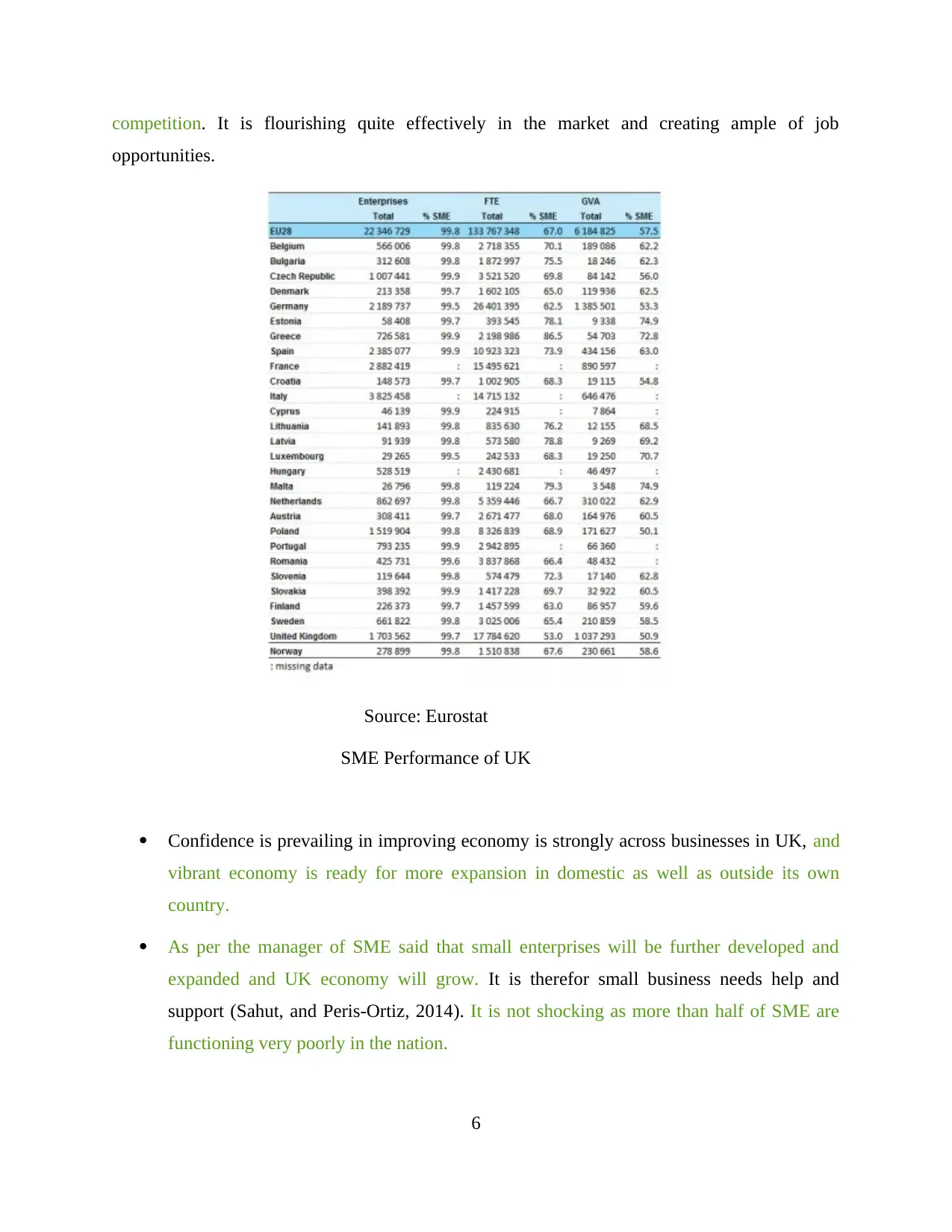
competition. It is flourishing quite effectively in the market and creating ample of job
opportunities.
Source: Eurostat
SME Performance of UK
Confidence is prevailing in improving economy is strongly across businesses in UK, and
vibrant economy is ready for more expansion in domestic as well as outside its own
country.
As per the manager of SME said that small enterprises will be further developed and
expanded and UK economy will grow. It is therefor small business needs help and
support (Sahut, and Peris-Ortiz, 2014). It is not shocking as more than half of SME are
functioning very poorly in the nation.
6
opportunities.
Source: Eurostat
SME Performance of UK
Confidence is prevailing in improving economy is strongly across businesses in UK, and
vibrant economy is ready for more expansion in domestic as well as outside its own
country.
As per the manager of SME said that small enterprises will be further developed and
expanded and UK economy will grow. It is therefor small business needs help and
support (Sahut, and Peris-Ortiz, 2014). It is not shocking as more than half of SME are
functioning very poorly in the nation.
6
You're viewing a preview
Unlock full access by subscribing today!
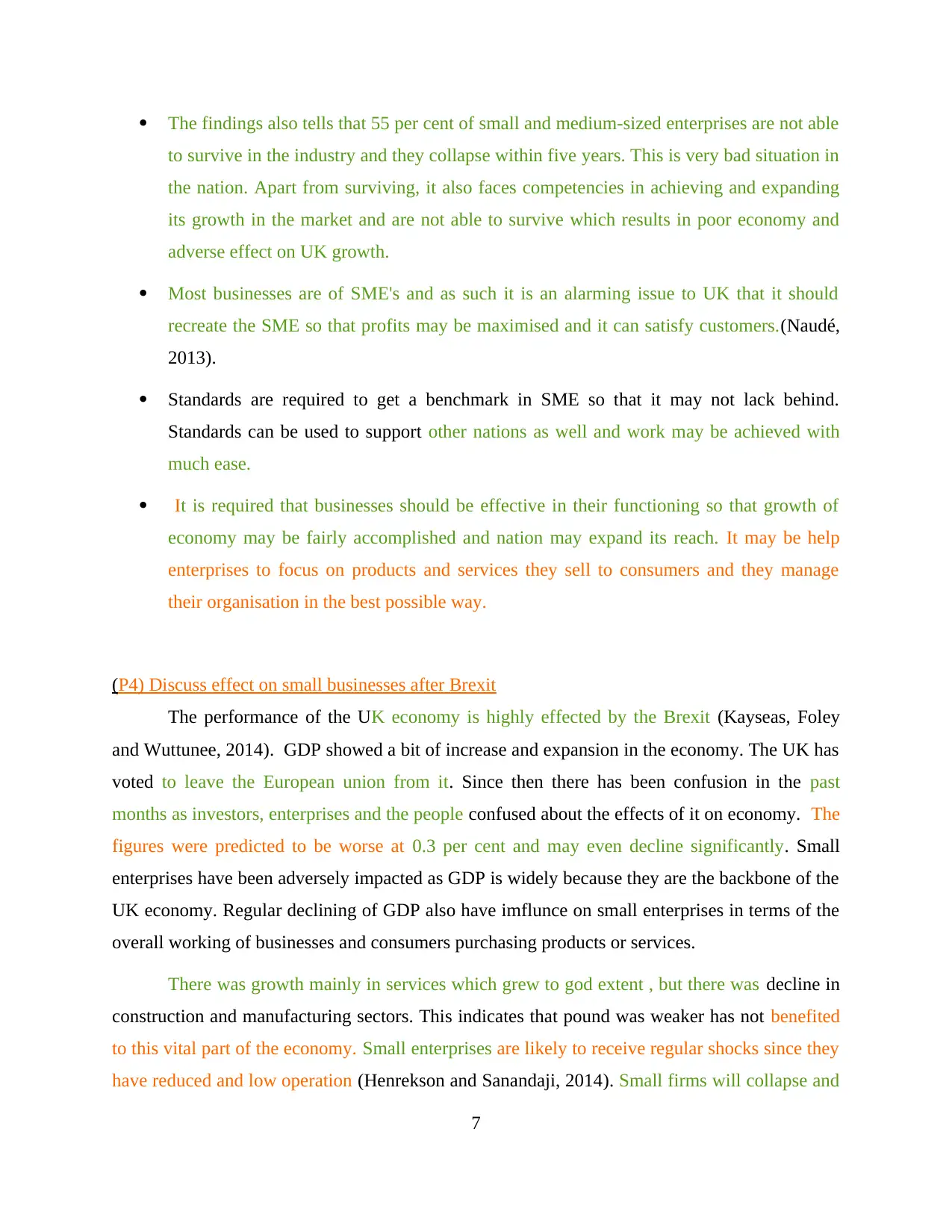
The findings also tells that 55 per cent of small and medium-sized enterprises are not able
to survive in the industry and they collapse within five years. This is very bad situation in
the nation. Apart from surviving, it also faces competencies in achieving and expanding
its growth in the market and are not able to survive which results in poor economy and
adverse effect on UK growth.
Most businesses are of SME's and as such it is an alarming issue to UK that it should
recreate the SME so that profits may be maximised and it can satisfy customers.(Naudé,
2013).
Standards are required to get a benchmark in SME so that it may not lack behind.
Standards can be used to support other nations as well and work may be achieved with
much ease.
It is required that businesses should be effective in their functioning so that growth of
economy may be fairly accomplished and nation may expand its reach. It may be help
enterprises to focus on products and services they sell to consumers and they manage
their organisation in the best possible way.
(P4) Discuss effect on small businesses after Brexit
The performance of the UK economy is highly effected by the Brexit (Kayseas, Foley
and Wuttunee, 2014). GDP showed a bit of increase and expansion in the economy. The UK has
voted to leave the European union from it. Since then there has been confusion in the past
months as investors, enterprises and the people confused about the effects of it on economy. The
figures were predicted to be worse at 0.3 per cent and may even decline significantly. Small
enterprises have been adversely impacted as GDP is widely because they are the backbone of the
UK economy. Regular declining of GDP also have imflunce on small enterprises in terms of the
overall working of businesses and consumers purchasing products or services.
There was growth mainly in services which grew to god extent , but there was decline in
construction and manufacturing sectors. This indicates that pound was weaker has not benefited
to this vital part of the economy. Small enterprises are likely to receive regular shocks since they
have reduced and low operation (Henrekson and Sanandaji, 2014). Small firms will collapse and
7
to survive in the industry and they collapse within five years. This is very bad situation in
the nation. Apart from surviving, it also faces competencies in achieving and expanding
its growth in the market and are not able to survive which results in poor economy and
adverse effect on UK growth.
Most businesses are of SME's and as such it is an alarming issue to UK that it should
recreate the SME so that profits may be maximised and it can satisfy customers.(Naudé,
2013).
Standards are required to get a benchmark in SME so that it may not lack behind.
Standards can be used to support other nations as well and work may be achieved with
much ease.
It is required that businesses should be effective in their functioning so that growth of
economy may be fairly accomplished and nation may expand its reach. It may be help
enterprises to focus on products and services they sell to consumers and they manage
their organisation in the best possible way.
(P4) Discuss effect on small businesses after Brexit
The performance of the UK economy is highly effected by the Brexit (Kayseas, Foley
and Wuttunee, 2014). GDP showed a bit of increase and expansion in the economy. The UK has
voted to leave the European union from it. Since then there has been confusion in the past
months as investors, enterprises and the people confused about the effects of it on economy. The
figures were predicted to be worse at 0.3 per cent and may even decline significantly. Small
enterprises have been adversely impacted as GDP is widely because they are the backbone of the
UK economy. Regular declining of GDP also have imflunce on small enterprises in terms of the
overall working of businesses and consumers purchasing products or services.
There was growth mainly in services which grew to god extent , but there was decline in
construction and manufacturing sectors. This indicates that pound was weaker has not benefited
to this vital part of the economy. Small enterprises are likely to receive regular shocks since they
have reduced and low operation (Henrekson and Sanandaji, 2014). Small firms will collapse and
7
Paraphrase This Document
Need a fresh take? Get an instant paraphrase of this document with our AI Paraphraser
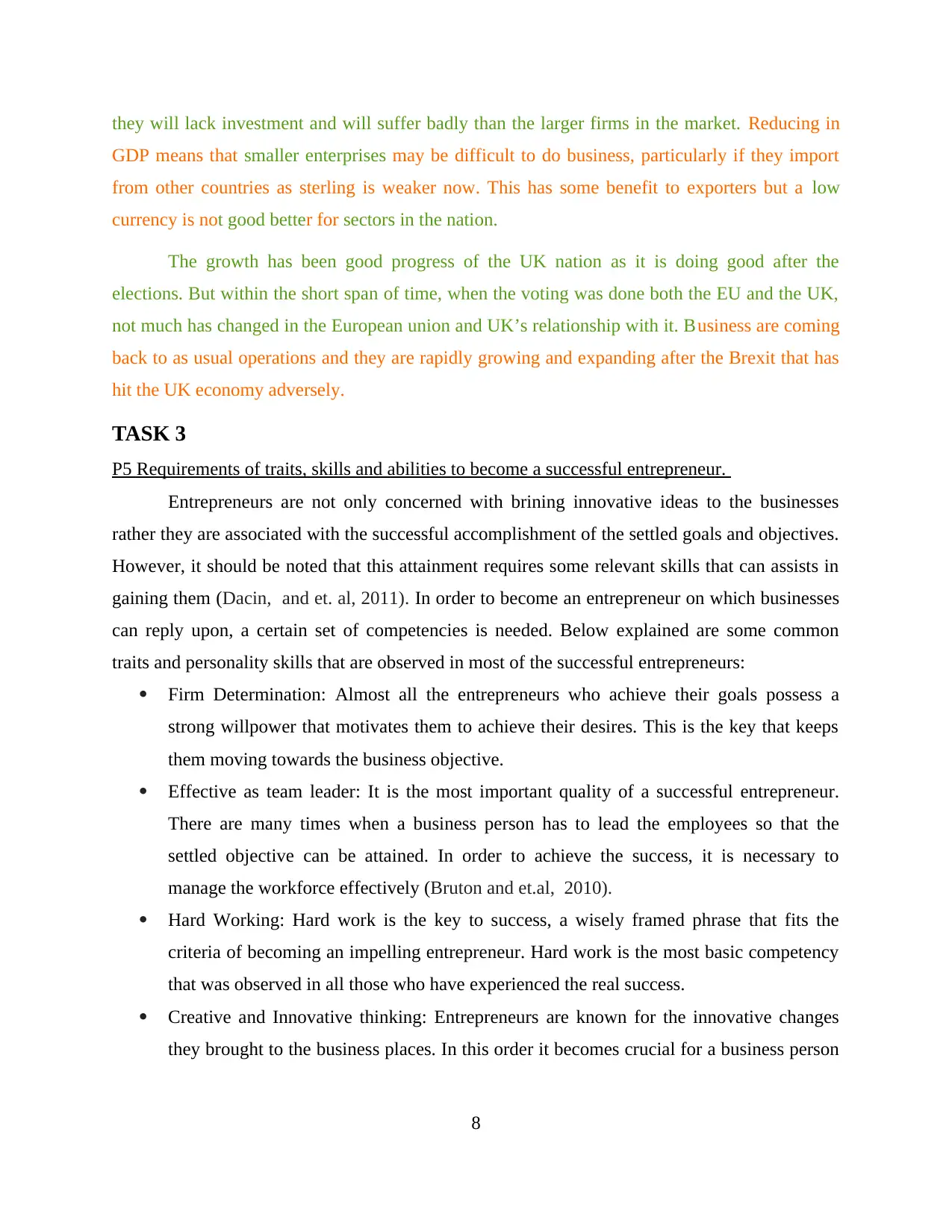
they will lack investment and will suffer badly than the larger firms in the market. Reducing in
GDP means that smaller enterprises may be difficult to do business, particularly if they import
from other countries as sterling is weaker now. This has some benefit to exporters but a low
currency is not good better for sectors in the nation.
The growth has been good progress of the UK nation as it is doing good after the
elections. But within the short span of time, when the voting was done both the EU and the UK,
not much has changed in the European union and UK’s relationship with it. Business are coming
back to as usual operations and they are rapidly growing and expanding after the Brexit that has
hit the UK economy adversely.
TASK 3
P5 Requirements of traits, skills and abilities to become a successful entrepreneur.
Entrepreneurs are not only concerned with brining innovative ideas to the businesses
rather they are associated with the successful accomplishment of the settled goals and objectives.
However, it should be noted that this attainment requires some relevant skills that can assists in
gaining them (Dacin, and et. al, 2011). In order to become an entrepreneur on which businesses
can reply upon, a certain set of competencies is needed. Below explained are some common
traits and personality skills that are observed in most of the successful entrepreneurs:
Firm Determination: Almost all the entrepreneurs who achieve their goals possess a
strong willpower that motivates them to achieve their desires. This is the key that keeps
them moving towards the business objective.
Effective as team leader: It is the most important quality of a successful entrepreneur.
There are many times when a business person has to lead the employees so that the
settled objective can be attained. In order to achieve the success, it is necessary to
manage the workforce effectively (Bruton and et.al, 2010).
Hard Working: Hard work is the key to success, a wisely framed phrase that fits the
criteria of becoming an impelling entrepreneur. Hard work is the most basic competency
that was observed in all those who have experienced the real success.
Creative and Innovative thinking: Entrepreneurs are known for the innovative changes
they brought to the business places. In this order it becomes crucial for a business person
8
GDP means that smaller enterprises may be difficult to do business, particularly if they import
from other countries as sterling is weaker now. This has some benefit to exporters but a low
currency is not good better for sectors in the nation.
The growth has been good progress of the UK nation as it is doing good after the
elections. But within the short span of time, when the voting was done both the EU and the UK,
not much has changed in the European union and UK’s relationship with it. Business are coming
back to as usual operations and they are rapidly growing and expanding after the Brexit that has
hit the UK economy adversely.
TASK 3
P5 Requirements of traits, skills and abilities to become a successful entrepreneur.
Entrepreneurs are not only concerned with brining innovative ideas to the businesses
rather they are associated with the successful accomplishment of the settled goals and objectives.
However, it should be noted that this attainment requires some relevant skills that can assists in
gaining them (Dacin, and et. al, 2011). In order to become an entrepreneur on which businesses
can reply upon, a certain set of competencies is needed. Below explained are some common
traits and personality skills that are observed in most of the successful entrepreneurs:
Firm Determination: Almost all the entrepreneurs who achieve their goals possess a
strong willpower that motivates them to achieve their desires. This is the key that keeps
them moving towards the business objective.
Effective as team leader: It is the most important quality of a successful entrepreneur.
There are many times when a business person has to lead the employees so that the
settled objective can be attained. In order to achieve the success, it is necessary to
manage the workforce effectively (Bruton and et.al, 2010).
Hard Working: Hard work is the key to success, a wisely framed phrase that fits the
criteria of becoming an impelling entrepreneur. Hard work is the most basic competency
that was observed in all those who have experienced the real success.
Creative and Innovative thinking: Entrepreneurs are known for the innovative changes
they brought to the business places. In this order it becomes crucial for a business person
8
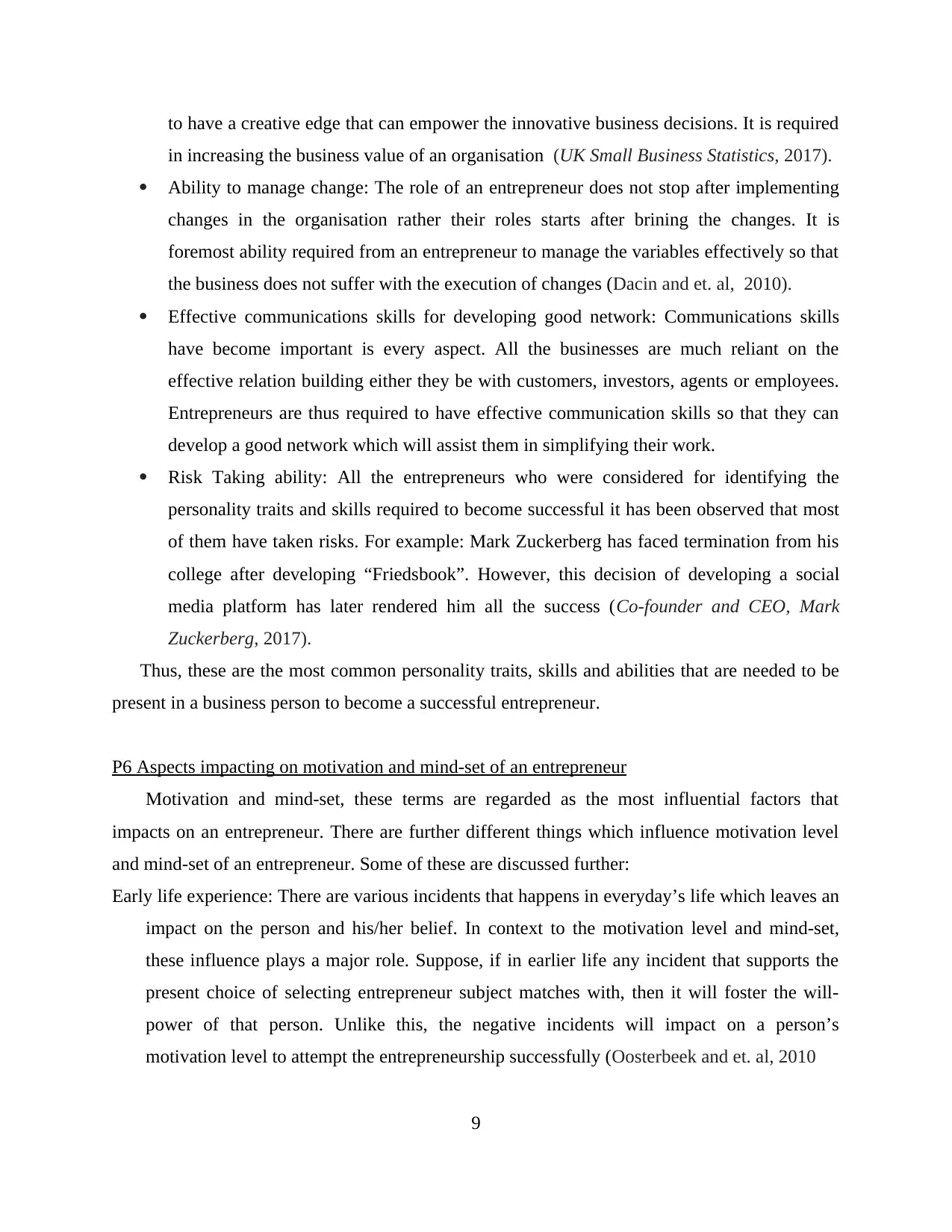
to have a creative edge that can empower the innovative business decisions. It is required
in increasing the business value of an organisation (UK Small Business Statistics, 2017).
Ability to manage change: The role of an entrepreneur does not stop after implementing
changes in the organisation rather their roles starts after brining the changes. It is
foremost ability required from an entrepreneur to manage the variables effectively so that
the business does not suffer with the execution of changes (Dacin and et. al, 2010).
Effective communications skills for developing good network: Communications skills
have become important is every aspect. All the businesses are much reliant on the
effective relation building either they be with customers, investors, agents or employees.
Entrepreneurs are thus required to have effective communication skills so that they can
develop a good network which will assist them in simplifying their work.
Risk Taking ability: All the entrepreneurs who were considered for identifying the
personality traits and skills required to become successful it has been observed that most
of them have taken risks. For example: Mark Zuckerberg has faced termination from his
college after developing “Friedsbook”. However, this decision of developing a social
media platform has later rendered him all the success (Co-founder and CEO, Mark
Zuckerberg, 2017).
Thus, these are the most common personality traits, skills and abilities that are needed to be
present in a business person to become a successful entrepreneur.
P6 Aspects impacting on motivation and mind-set of an entrepreneur
Motivation and mind-set, these terms are regarded as the most influential factors that
impacts on an entrepreneur. There are further different things which influence motivation level
and mind-set of an entrepreneur. Some of these are discussed further:
Early life experience: There are various incidents that happens in everyday’s life which leaves an
impact on the person and his/her belief. In context to the motivation level and mind-set,
these influence plays a major role. Suppose, if in earlier life any incident that supports the
present choice of selecting entrepreneur subject matches with, then it will foster the will-
power of that person. Unlike this, the negative incidents will impact on a person’s
motivation level to attempt the entrepreneurship successfully (Oosterbeek and et. al, 2010
9
in increasing the business value of an organisation (UK Small Business Statistics, 2017).
Ability to manage change: The role of an entrepreneur does not stop after implementing
changes in the organisation rather their roles starts after brining the changes. It is
foremost ability required from an entrepreneur to manage the variables effectively so that
the business does not suffer with the execution of changes (Dacin and et. al, 2010).
Effective communications skills for developing good network: Communications skills
have become important is every aspect. All the businesses are much reliant on the
effective relation building either they be with customers, investors, agents or employees.
Entrepreneurs are thus required to have effective communication skills so that they can
develop a good network which will assist them in simplifying their work.
Risk Taking ability: All the entrepreneurs who were considered for identifying the
personality traits and skills required to become successful it has been observed that most
of them have taken risks. For example: Mark Zuckerberg has faced termination from his
college after developing “Friedsbook”. However, this decision of developing a social
media platform has later rendered him all the success (Co-founder and CEO, Mark
Zuckerberg, 2017).
Thus, these are the most common personality traits, skills and abilities that are needed to be
present in a business person to become a successful entrepreneur.
P6 Aspects impacting on motivation and mind-set of an entrepreneur
Motivation and mind-set, these terms are regarded as the most influential factors that
impacts on an entrepreneur. There are further different things which influence motivation level
and mind-set of an entrepreneur. Some of these are discussed further:
Early life experience: There are various incidents that happens in everyday’s life which leaves an
impact on the person and his/her belief. In context to the motivation level and mind-set,
these influence plays a major role. Suppose, if in earlier life any incident that supports the
present choice of selecting entrepreneur subject matches with, then it will foster the will-
power of that person. Unlike this, the negative incidents will impact on a person’s
motivation level to attempt the entrepreneurship successfully (Oosterbeek and et. al, 2010
9
You're viewing a preview
Unlock full access by subscribing today!
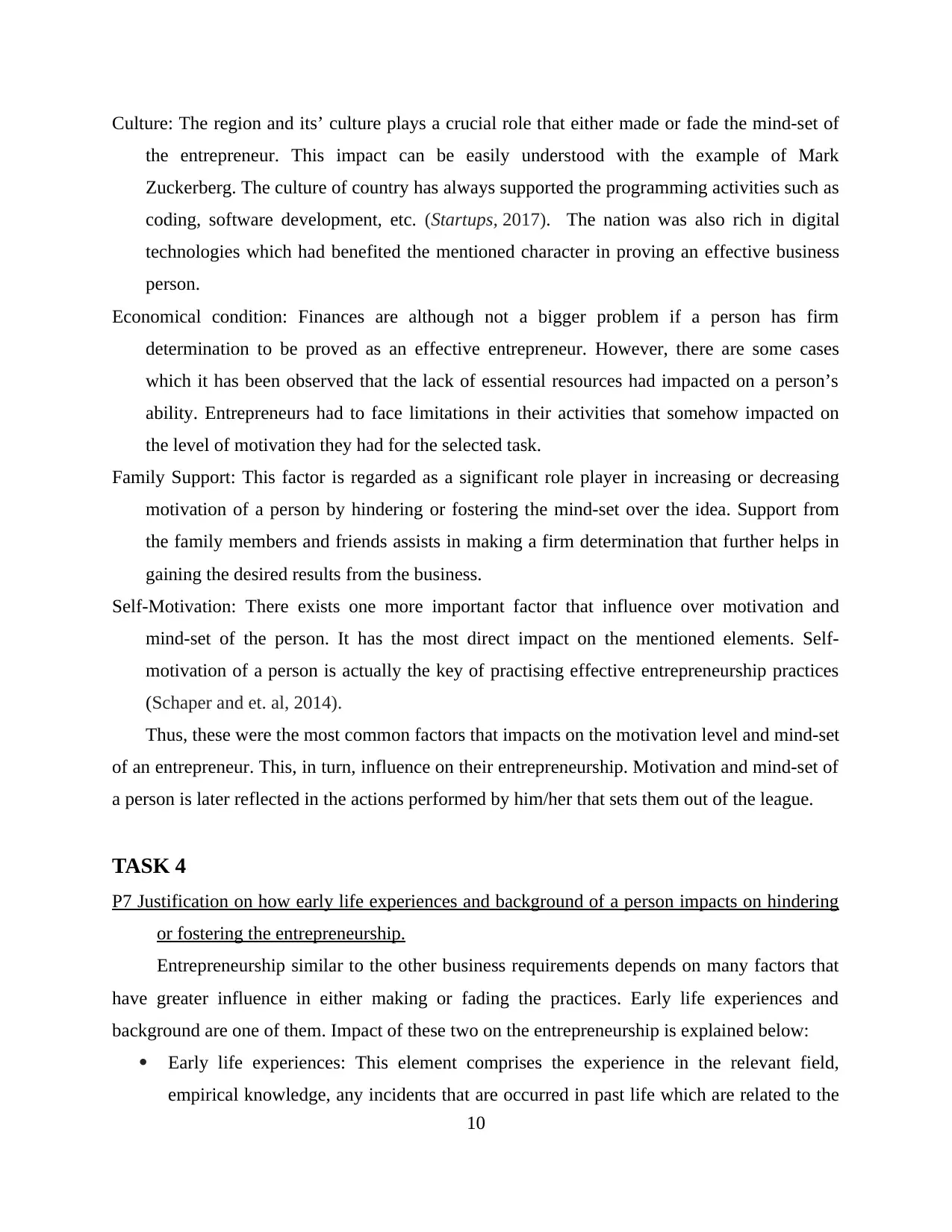
Culture: The region and its’ culture plays a crucial role that either made or fade the mind-set of
the entrepreneur. This impact can be easily understood with the example of Mark
Zuckerberg. The culture of country has always supported the programming activities such as
coding, software development, etc. (Startups, 2017). The nation was also rich in digital
technologies which had benefited the mentioned character in proving an effective business
person.
Economical condition: Finances are although not a bigger problem if a person has firm
determination to be proved as an effective entrepreneur. However, there are some cases
which it has been observed that the lack of essential resources had impacted on a person’s
ability. Entrepreneurs had to face limitations in their activities that somehow impacted on
the level of motivation they had for the selected task.
Family Support: This factor is regarded as a significant role player in increasing or decreasing
motivation of a person by hindering or fostering the mind-set over the idea. Support from
the family members and friends assists in making a firm determination that further helps in
gaining the desired results from the business.
Self-Motivation: There exists one more important factor that influence over motivation and
mind-set of the person. It has the most direct impact on the mentioned elements. Self-
motivation of a person is actually the key of practising effective entrepreneurship practices
(Schaper and et. al, 2014).
Thus, these were the most common factors that impacts on the motivation level and mind-set
of an entrepreneur. This, in turn, influence on their entrepreneurship. Motivation and mind-set of
a person is later reflected in the actions performed by him/her that sets them out of the league.
TASK 4
P7 Justification on how early life experiences and background of a person impacts on hindering
or fostering the entrepreneurship.
Entrepreneurship similar to the other business requirements depends on many factors that
have greater influence in either making or fading the practices. Early life experiences and
background are one of them. Impact of these two on the entrepreneurship is explained below:
Early life experiences: This element comprises the experience in the relevant field,
empirical knowledge, any incidents that are occurred in past life which are related to the
10
the entrepreneur. This impact can be easily understood with the example of Mark
Zuckerberg. The culture of country has always supported the programming activities such as
coding, software development, etc. (Startups, 2017). The nation was also rich in digital
technologies which had benefited the mentioned character in proving an effective business
person.
Economical condition: Finances are although not a bigger problem if a person has firm
determination to be proved as an effective entrepreneur. However, there are some cases
which it has been observed that the lack of essential resources had impacted on a person’s
ability. Entrepreneurs had to face limitations in their activities that somehow impacted on
the level of motivation they had for the selected task.
Family Support: This factor is regarded as a significant role player in increasing or decreasing
motivation of a person by hindering or fostering the mind-set over the idea. Support from
the family members and friends assists in making a firm determination that further helps in
gaining the desired results from the business.
Self-Motivation: There exists one more important factor that influence over motivation and
mind-set of the person. It has the most direct impact on the mentioned elements. Self-
motivation of a person is actually the key of practising effective entrepreneurship practices
(Schaper and et. al, 2014).
Thus, these were the most common factors that impacts on the motivation level and mind-set
of an entrepreneur. This, in turn, influence on their entrepreneurship. Motivation and mind-set of
a person is later reflected in the actions performed by him/her that sets them out of the league.
TASK 4
P7 Justification on how early life experiences and background of a person impacts on hindering
or fostering the entrepreneurship.
Entrepreneurship similar to the other business requirements depends on many factors that
have greater influence in either making or fading the practices. Early life experiences and
background are one of them. Impact of these two on the entrepreneurship is explained below:
Early life experiences: This element comprises the experience in the relevant field,
empirical knowledge, any incidents that are occurred in past life which are related to the
10
Paraphrase This Document
Need a fresh take? Get an instant paraphrase of this document with our AI Paraphraser
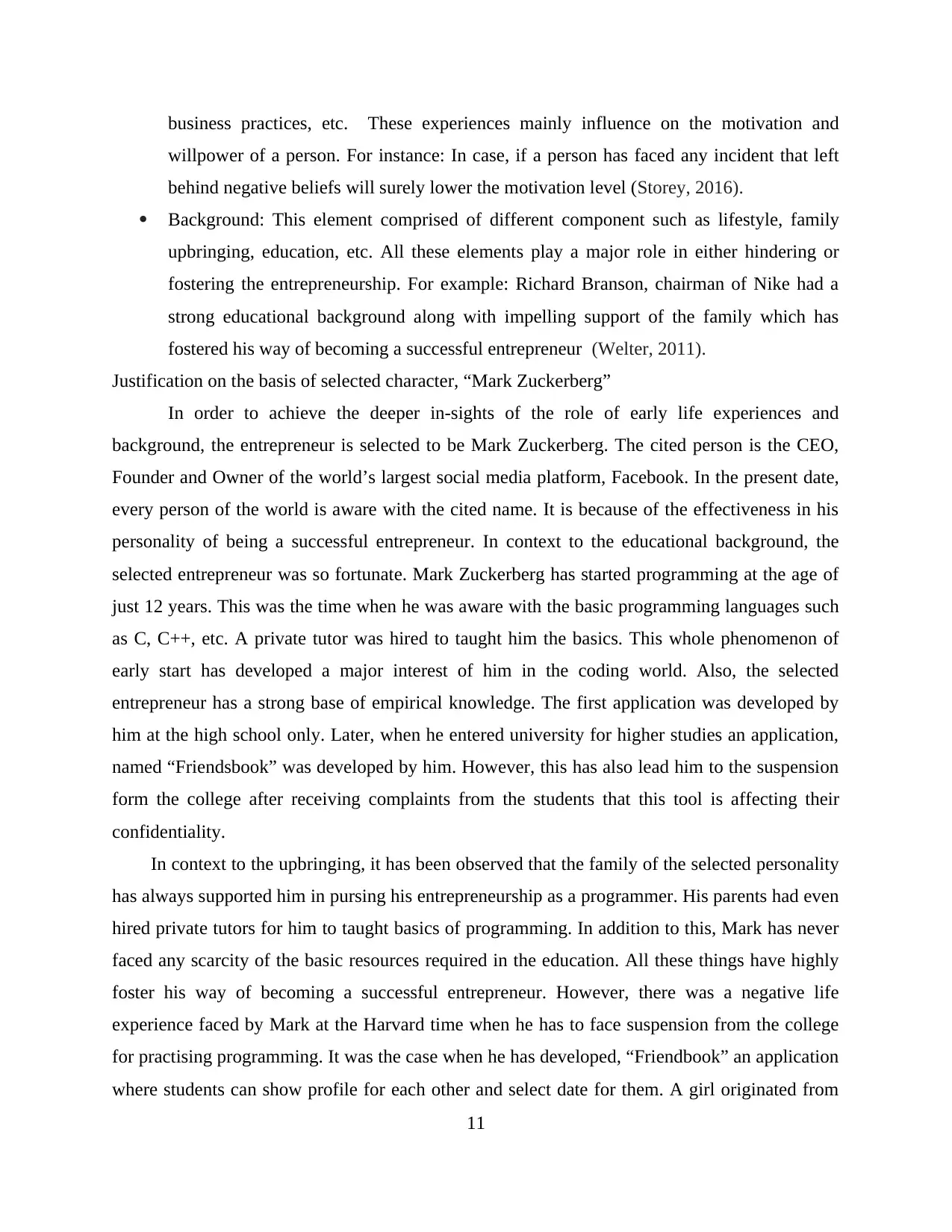
business practices, etc. These experiences mainly influence on the motivation and
willpower of a person. For instance: In case, if a person has faced any incident that left
behind negative beliefs will surely lower the motivation level (Storey, 2016).
Background: This element comprised of different component such as lifestyle, family
upbringing, education, etc. All these elements play a major role in either hindering or
fostering the entrepreneurship. For example: Richard Branson, chairman of Nike had a
strong educational background along with impelling support of the family which has
fostered his way of becoming a successful entrepreneur (Welter, 2011).
Justification on the basis of selected character, “Mark Zuckerberg”
In order to achieve the deeper in-sights of the role of early life experiences and
background, the entrepreneur is selected to be Mark Zuckerberg. The cited person is the CEO,
Founder and Owner of the world’s largest social media platform, Facebook. In the present date,
every person of the world is aware with the cited name. It is because of the effectiveness in his
personality of being a successful entrepreneur. In context to the educational background, the
selected entrepreneur was so fortunate. Mark Zuckerberg has started programming at the age of
just 12 years. This was the time when he was aware with the basic programming languages such
as C, C++, etc. A private tutor was hired to taught him the basics. This whole phenomenon of
early start has developed a major interest of him in the coding world. Also, the selected
entrepreneur has a strong base of empirical knowledge. The first application was developed by
him at the high school only. Later, when he entered university for higher studies an application,
named “Friendsbook” was developed by him. However, this has also lead him to the suspension
form the college after receiving complaints from the students that this tool is affecting their
confidentiality.
In context to the upbringing, it has been observed that the family of the selected personality
has always supported him in pursing his entrepreneurship as a programmer. His parents had even
hired private tutors for him to taught basics of programming. In addition to this, Mark has never
faced any scarcity of the basic resources required in the education. All these things have highly
foster his way of becoming a successful entrepreneur. However, there was a negative life
experience faced by Mark at the Harvard time when he has to face suspension from the college
for practising programming. It was the case when he has developed, “Friendbook” an application
where students can show profile for each other and select date for them. A girl originated from
11
willpower of a person. For instance: In case, if a person has faced any incident that left
behind negative beliefs will surely lower the motivation level (Storey, 2016).
Background: This element comprised of different component such as lifestyle, family
upbringing, education, etc. All these elements play a major role in either hindering or
fostering the entrepreneurship. For example: Richard Branson, chairman of Nike had a
strong educational background along with impelling support of the family which has
fostered his way of becoming a successful entrepreneur (Welter, 2011).
Justification on the basis of selected character, “Mark Zuckerberg”
In order to achieve the deeper in-sights of the role of early life experiences and
background, the entrepreneur is selected to be Mark Zuckerberg. The cited person is the CEO,
Founder and Owner of the world’s largest social media platform, Facebook. In the present date,
every person of the world is aware with the cited name. It is because of the effectiveness in his
personality of being a successful entrepreneur. In context to the educational background, the
selected entrepreneur was so fortunate. Mark Zuckerberg has started programming at the age of
just 12 years. This was the time when he was aware with the basic programming languages such
as C, C++, etc. A private tutor was hired to taught him the basics. This whole phenomenon of
early start has developed a major interest of him in the coding world. Also, the selected
entrepreneur has a strong base of empirical knowledge. The first application was developed by
him at the high school only. Later, when he entered university for higher studies an application,
named “Friendsbook” was developed by him. However, this has also lead him to the suspension
form the college after receiving complaints from the students that this tool is affecting their
confidentiality.
In context to the upbringing, it has been observed that the family of the selected personality
has always supported him in pursing his entrepreneurship as a programmer. His parents had even
hired private tutors for him to taught basics of programming. In addition to this, Mark has never
faced any scarcity of the basic resources required in the education. All these things have highly
foster his way of becoming a successful entrepreneur. However, there was a negative life
experience faced by Mark at the Harvard time when he has to face suspension from the college
for practising programming. It was the case when he has developed, “Friendbook” an application
where students can show profile for each other and select date for them. A girl originated from
11

India had first reported this as a threat to their confidentiality which later influenced higher level
authorities to drop out Mark from the degree. This incident has hindered the entrepreneurship of
the selected Zuckerberg. However, it should be recognize that by making use of the impelling
skills, technical knowledge, competencies and personality traits, he has made it and now turned
out to be the most liked and appreciated entrepreneur at the very young age. Thus, this justifies
the role of early life experiences and background in hindering and fostering the entrepreneurship
exercises.
CONCLUSIONS
From the present undertaking, it can be concluded that entrepreneurship and small
businesses plays a major role in the development of the countries. These are significant for the
financial, social, and economic growth of a nation. Thus, it is concluded that administration and
local responsive bodies should emphasise on their development as a whole so that effectiveness
can be gained in the markets of UK. In addition to this, this report has also shed lights on the
significance of essential traits and skills that should be possessed by the business persons. This
undertaking has also rendered information on the various factors that can influence
entrepreneurship. Further, factors that assists in increasing the motivation level of entrepreneurs
to improve their mind-set is also assessed in this undertaken report.
REFERENCES
12
authorities to drop out Mark from the degree. This incident has hindered the entrepreneurship of
the selected Zuckerberg. However, it should be recognize that by making use of the impelling
skills, technical knowledge, competencies and personality traits, he has made it and now turned
out to be the most liked and appreciated entrepreneur at the very young age. Thus, this justifies
the role of early life experiences and background in hindering and fostering the entrepreneurship
exercises.
CONCLUSIONS
From the present undertaking, it can be concluded that entrepreneurship and small
businesses plays a major role in the development of the countries. These are significant for the
financial, social, and economic growth of a nation. Thus, it is concluded that administration and
local responsive bodies should emphasise on their development as a whole so that effectiveness
can be gained in the markets of UK. In addition to this, this report has also shed lights on the
significance of essential traits and skills that should be possessed by the business persons. This
undertaking has also rendered information on the various factors that can influence
entrepreneurship. Further, factors that assists in increasing the motivation level of entrepreneurs
to improve their mind-set is also assessed in this undertaken report.
REFERENCES
12
You're viewing a preview
Unlock full access by subscribing today!
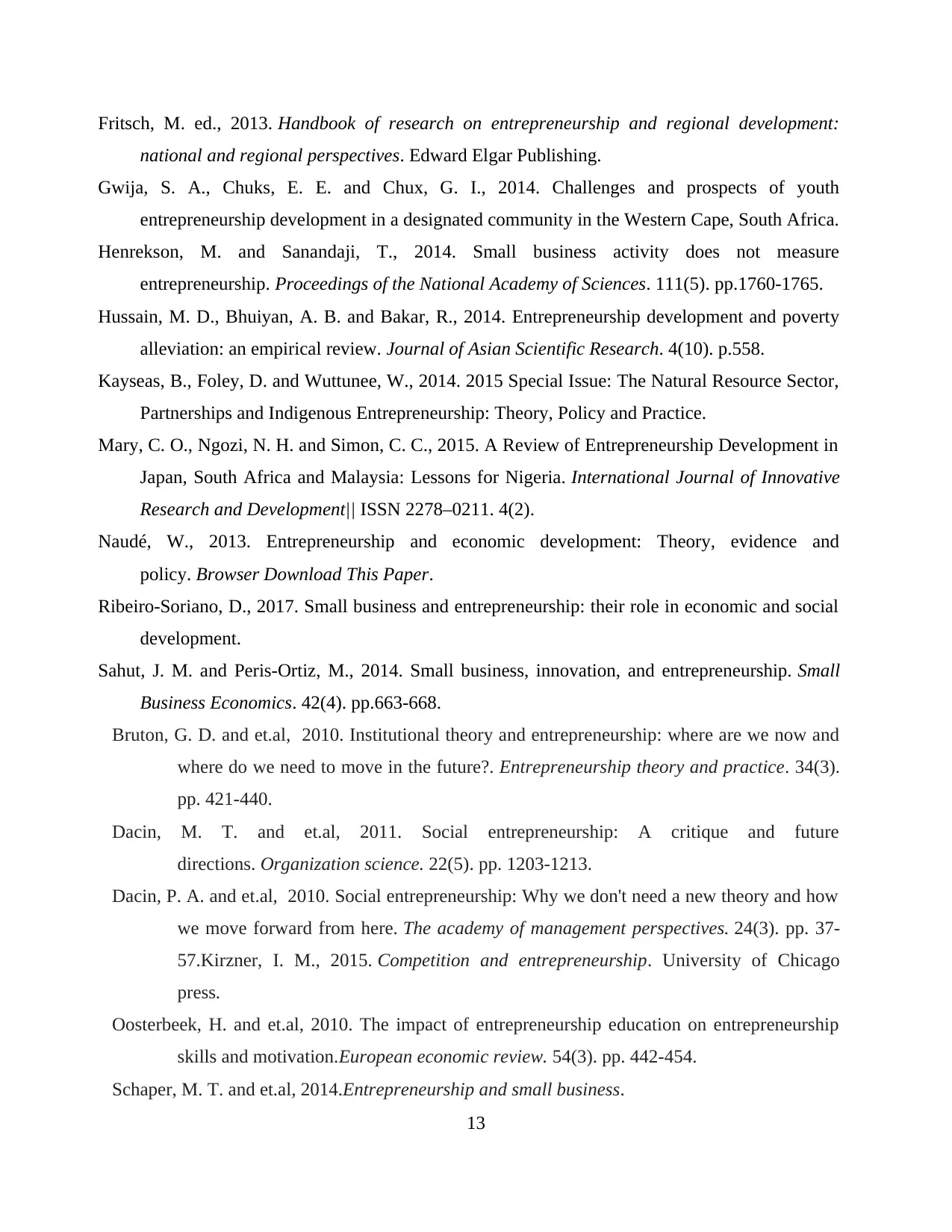
Fritsch, M. ed., 2013. Handbook of research on entrepreneurship and regional development:
national and regional perspectives. Edward Elgar Publishing.
Gwija, S. A., Chuks, E. E. and Chux, G. I., 2014. Challenges and prospects of youth
entrepreneurship development in a designated community in the Western Cape, South Africa.
Henrekson, M. and Sanandaji, T., 2014. Small business activity does not measure
entrepreneurship. Proceedings of the National Academy of Sciences. 111(5). pp.1760-1765.
Hussain, M. D., Bhuiyan, A. B. and Bakar, R., 2014. Entrepreneurship development and poverty
alleviation: an empirical review. Journal of Asian Scientific Research. 4(10). p.558.
Kayseas, B., Foley, D. and Wuttunee, W., 2014. 2015 Special Issue: The Natural Resource Sector,
Partnerships and Indigenous Entrepreneurship: Theory, Policy and Practice.
Mary, C. O., Ngozi, N. H. and Simon, C. C., 2015. A Review of Entrepreneurship Development in
Japan, South Africa and Malaysia: Lessons for Nigeria. International Journal of Innovative
Research and Development|| ISSN 2278–0211. 4(2).
Naudé, W., 2013. Entrepreneurship and economic development: Theory, evidence and
policy. Browser Download This Paper.
Ribeiro-Soriano, D., 2017. Small business and entrepreneurship: their role in economic and social
development.
Sahut, J. M. and Peris-Ortiz, M., 2014. Small business, innovation, and entrepreneurship. Small
Business Economics. 42(4). pp.663-668.
Bruton, G. D. and et.al, 2010. Institutional theory and entrepreneurship: where are we now and
where do we need to move in the future?. Entrepreneurship theory and practice. 34(3).
pp. 421-440.
Dacin, M. T. and et.al, 2011. Social entrepreneurship: A critique and future
directions. Organization science. 22(5). pp. 1203-1213.
Dacin, P. A. and et.al, 2010. Social entrepreneurship: Why we don't need a new theory and how
we move forward from here. The academy of management perspectives. 24(3). pp. 37-
57.Kirzner, I. M., 2015. Competition and entrepreneurship. University of Chicago
press.
Oosterbeek, H. and et.al, 2010. The impact of entrepreneurship education on entrepreneurship
skills and motivation.European economic review. 54(3). pp. 442-454.
Schaper, M. T. and et.al, 2014.Entrepreneurship and small business.
13
national and regional perspectives. Edward Elgar Publishing.
Gwija, S. A., Chuks, E. E. and Chux, G. I., 2014. Challenges and prospects of youth
entrepreneurship development in a designated community in the Western Cape, South Africa.
Henrekson, M. and Sanandaji, T., 2014. Small business activity does not measure
entrepreneurship. Proceedings of the National Academy of Sciences. 111(5). pp.1760-1765.
Hussain, M. D., Bhuiyan, A. B. and Bakar, R., 2014. Entrepreneurship development and poverty
alleviation: an empirical review. Journal of Asian Scientific Research. 4(10). p.558.
Kayseas, B., Foley, D. and Wuttunee, W., 2014. 2015 Special Issue: The Natural Resource Sector,
Partnerships and Indigenous Entrepreneurship: Theory, Policy and Practice.
Mary, C. O., Ngozi, N. H. and Simon, C. C., 2015. A Review of Entrepreneurship Development in
Japan, South Africa and Malaysia: Lessons for Nigeria. International Journal of Innovative
Research and Development|| ISSN 2278–0211. 4(2).
Naudé, W., 2013. Entrepreneurship and economic development: Theory, evidence and
policy. Browser Download This Paper.
Ribeiro-Soriano, D., 2017. Small business and entrepreneurship: their role in economic and social
development.
Sahut, J. M. and Peris-Ortiz, M., 2014. Small business, innovation, and entrepreneurship. Small
Business Economics. 42(4). pp.663-668.
Bruton, G. D. and et.al, 2010. Institutional theory and entrepreneurship: where are we now and
where do we need to move in the future?. Entrepreneurship theory and practice. 34(3).
pp. 421-440.
Dacin, M. T. and et.al, 2011. Social entrepreneurship: A critique and future
directions. Organization science. 22(5). pp. 1203-1213.
Dacin, P. A. and et.al, 2010. Social entrepreneurship: Why we don't need a new theory and how
we move forward from here. The academy of management perspectives. 24(3). pp. 37-
57.Kirzner, I. M., 2015. Competition and entrepreneurship. University of Chicago
press.
Oosterbeek, H. and et.al, 2010. The impact of entrepreneurship education on entrepreneurship
skills and motivation.European economic review. 54(3). pp. 442-454.
Schaper, M. T. and et.al, 2014.Entrepreneurship and small business.
13
Paraphrase This Document
Need a fresh take? Get an instant paraphrase of this document with our AI Paraphraser
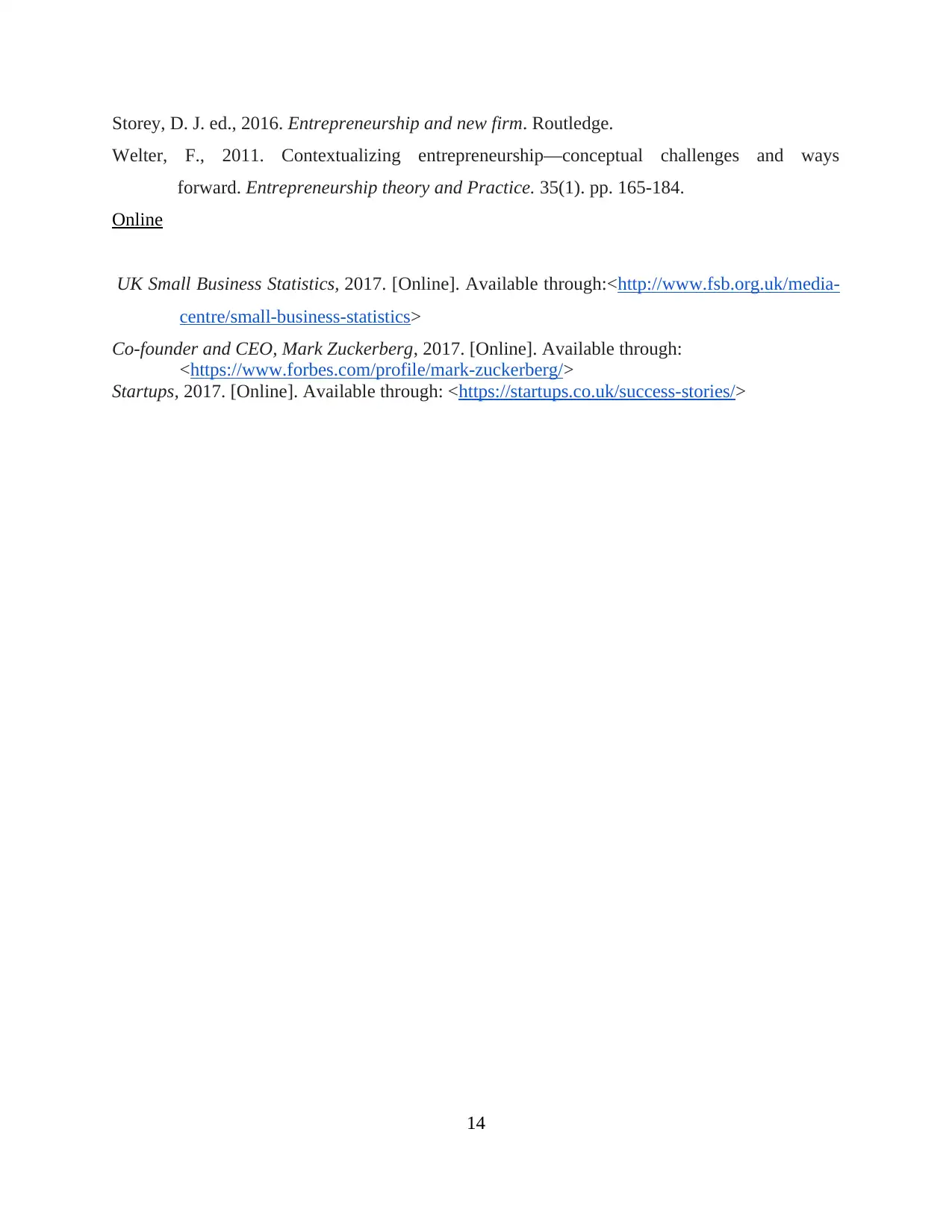
Storey, D. J. ed., 2016. Entrepreneurship and new firm. Routledge.
Welter, F., 2011. Contextualizing entrepreneurship—conceptual challenges and ways
forward. Entrepreneurship theory and Practice. 35(1). pp. 165-184.
Online
UK Small Business Statistics, 2017. [Online]. Available through:<http://www.fsb.org.uk/media-
centre/small-business-statistics>
Co-founder and CEO, Mark Zuckerberg, 2017. [Online]. Available through:
<https://www.forbes.com/profile/mark-zuckerberg/>
Startups, 2017. [Online]. Available through: <https://startups.co.uk/success-stories/>
14
Welter, F., 2011. Contextualizing entrepreneurship—conceptual challenges and ways
forward. Entrepreneurship theory and Practice. 35(1). pp. 165-184.
Online
UK Small Business Statistics, 2017. [Online]. Available through:<http://www.fsb.org.uk/media-
centre/small-business-statistics>
Co-founder and CEO, Mark Zuckerberg, 2017. [Online]. Available through:
<https://www.forbes.com/profile/mark-zuckerberg/>
Startups, 2017. [Online]. Available through: <https://startups.co.uk/success-stories/>
14
1 out of 14
Related Documents
Your All-in-One AI-Powered Toolkit for Academic Success.
+13062052269
info@desklib.com
Available 24*7 on WhatsApp / Email
![[object Object]](/_next/static/media/star-bottom.7253800d.svg)
Unlock your academic potential
© 2024 | Zucol Services PVT LTD | All rights reserved.





